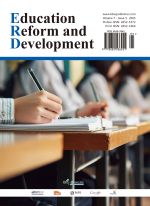Abstract
China’s ongoing new curriculum reform has prompted extensive changes in student academic assessment. Therefore, assessment literacy is now recognized as a central component of professional standards for teachers. The enhancement of assessment literacy among primary and secondary school teachers represents a significant aspect of their professional development. In addition, it represents a critical element influencing the reform and advancement of basic education. Utilizing a self-developed assessment tool, this study determined that primary and secondary school teachers in China’s X province possess assessment literacy levels exceeding the average. However, significant differences exist based on school location, teaching grade level, professional background, years of experience, professional title, and class size. Notwithstanding the overall positive findings, several challenges remain, including deficiencies in assessment knowledge and differences in assessment practices between urban and rural teachers. Besides, issues of insufficient overall assessment literacy and comparatively lower levels among novice teachers require attention. Addressing these identified issues through research offers valuable theoretical grounding for the adjustment, development, and execution of relevant policies.
References
Yang J, Wang H, 2022, On the Consistency of “Teaching, Learning and Assessment” in “With Literacy as the Foundation” and Its Teaching Realization. Educational Science Research, 332(11): 64–70.
Sheng Y, Zhang H, 2022, The Connotation Deconstruction Value Implication and Evaluation Framework of Teachers’ Assessment Literacy in the New Era. Curriculum, Teaching Material and Method, 42(5): 146–152.
Leung C, 2014, Classroom-based Assessment Issues for Language Teacher Education. The Companion to Language Assessment (vol. 3), Wiley Blackwell, Chichester, 1510–1519.
Li S, 2019, A Study on Junior High School Teachers’ Classroom Assessment Literacy. Doctoral Dissertation, 2019: 184.
Berliner DC, 1994, Expertise: The Wonders of Exemplary Performance. Creating Powerful Thinking in Teachers and Students, Harcourt Brace College, Fort Worth, 141–186.
Fang X, Yang G, 2016, Research on the Factors of College Teachers’ Behavior Intention for MOOC Teaching. Open Education Research, 22(2): 67–76.
